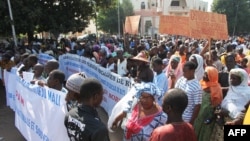BAMAKO, MALI —
Hundreds marched in the Malian capital of Bamako on Friday at Liberty Plaza to protest the proposed deployment of troops from West African bloc ECOWAS to Mali. The troops, if they come, would be used to retake northern Mali from al-Qaida-linked Islamist militants who seized control of the region in April.
The coalition COPAM, which backs the military junta that overthrew Mali's government in March, organized the protest following an agreement earlier this week between Mali’s interim government and ECOWAS.
The agreement leaves open the possibility for ECOWAS troops to be based just outside the capital as part of a broader plan to help retake the country’s north. Northern Mali fell to Islamist militants in the chaos that followed the coup on March 22 in Bamako.
ECOWAS' role in mediating the post-coup political crisis, as well as the prospect of foreign troops in the capital, has been unpopular among certain segments of the Malian public.
On Friday, the protestors chanted "Down with ECOWAS" and expressed a deep distrust of the organization and its motives. One of the protest organizers is Moussa Drame, who said he is against ECOWAS because it is a syndicate that only serves the interests of other heads of state.
According to Drame, the best solution is a national convention in which the international community stops imposing its will and allows Mali to find its own solutions. ECOWAS, Drame said, wants to keep Mali down.
Several protestors held up pictures of coup leader Amadou Haya Sanogo. Others displayed handmade signs that said “liberate our arms,” in reference to the heavy weapons ordered by Mali, but blocked by neighboring Guinea since July amid concerns that they could fall into the wrong hands. Another sign warned, “ECOWAS arrival triggers civil war in Mali.”
The demonstration was described by organizers as a “peaceful march,” with dozens of Malian police and armed forces present to provide security.
A COPAM protest on May 21 saw crowds storm the presidential palace, where they beat Mali’s 70-year-old interim President, Dioncounda Traore, unconscious.
As the occupation of the north nears its seventh month, however, support for COPAM and the public's resistance to ECOWAS military assistance both appear to be waning.
COPAM, analysts say, is a "small but vocal minority" whose presence highlights the existing political tug of war in southern Mali that some say makes resolving the crisis in the north all the more difficult.
ECOWAS is seeking an intervention mandate from the U.N. Security Council. Mali was high on the agenda of a special Sahel session held in New York this week on the sidelines of the U.N. General Assembly. World leaders remain divided on the question of military intervention.
France, along with several of Mali's neighbors, has called for the Security Council to pass a resolution authorizing intervention as soon as possible. The United States, however, maintains that Mali must first have a democratically-elected government before it can adequately address the crisis in the north.
The coalition COPAM, which backs the military junta that overthrew Mali's government in March, organized the protest following an agreement earlier this week between Mali’s interim government and ECOWAS.
The agreement leaves open the possibility for ECOWAS troops to be based just outside the capital as part of a broader plan to help retake the country’s north. Northern Mali fell to Islamist militants in the chaos that followed the coup on March 22 in Bamako.
ECOWAS' role in mediating the post-coup political crisis, as well as the prospect of foreign troops in the capital, has been unpopular among certain segments of the Malian public.
On Friday, the protestors chanted "Down with ECOWAS" and expressed a deep distrust of the organization and its motives. One of the protest organizers is Moussa Drame, who said he is against ECOWAS because it is a syndicate that only serves the interests of other heads of state.
According to Drame, the best solution is a national convention in which the international community stops imposing its will and allows Mali to find its own solutions. ECOWAS, Drame said, wants to keep Mali down.
Several protestors held up pictures of coup leader Amadou Haya Sanogo. Others displayed handmade signs that said “liberate our arms,” in reference to the heavy weapons ordered by Mali, but blocked by neighboring Guinea since July amid concerns that they could fall into the wrong hands. Another sign warned, “ECOWAS arrival triggers civil war in Mali.”
The demonstration was described by organizers as a “peaceful march,” with dozens of Malian police and armed forces present to provide security.
A COPAM protest on May 21 saw crowds storm the presidential palace, where they beat Mali’s 70-year-old interim President, Dioncounda Traore, unconscious.
As the occupation of the north nears its seventh month, however, support for COPAM and the public's resistance to ECOWAS military assistance both appear to be waning.
COPAM, analysts say, is a "small but vocal minority" whose presence highlights the existing political tug of war in southern Mali that some say makes resolving the crisis in the north all the more difficult.
ECOWAS is seeking an intervention mandate from the U.N. Security Council. Mali was high on the agenda of a special Sahel session held in New York this week on the sidelines of the U.N. General Assembly. World leaders remain divided on the question of military intervention.
France, along with several of Mali's neighbors, has called for the Security Council to pass a resolution authorizing intervention as soon as possible. The United States, however, maintains that Mali must first have a democratically-elected government before it can adequately address the crisis in the north.












